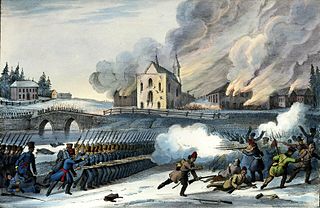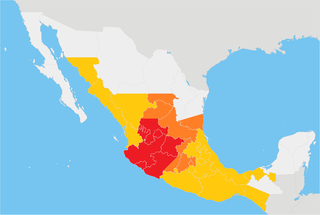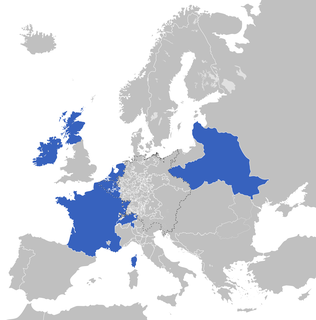
A war of independence or independence war is a conflict occurring over a territory that has declared independence from some nation-state or ruling colonial power. Once the state that previously held the territory sends in military forces to assert its sovereignty or the native population clashes with the former occupier, a separatist rebellion has begun. If a new state is successfully established, the conflict is usually known as a 'War of Independence'.

The Mexican Revolution was a major revolution, including a sequence of armed struggles, lasting roughly from 1910 to 1920, that transformed Mexican culture and government. Its outbreak in 1910 resulted from the increasing unpopularity of the 31-year-long regime of Porfirio Díaz and the regime's failure to find a controlled solution to presidential succession. This resulted in a power struggle among competing elites, which created the opportunity for agrarian insurrection. Wealthy landowner Francisco I. Madero challenged Díaz in the 1910 presidential election, and following the rigged results, revolted under the Plan of San Luis Potosí.

The Rebellions of 1837–1838, also sometimes called the Canadian Revolution, were two armed uprisings that took place in Lower and Upper Canada in 1837 and 1838. Both rebellions were motivated by frustrations with political reform. A key shared goal was responsible government, which was eventually achieved in the incidents' aftermath. The rebellions led directly to Lord Durham's Report on the Affairs of British North America and to Act of Union 1840 which partially reformed the British provinces into a unitary system and eventually led to the British North America Act, 1867 which created Canada and its government.

Tenentism was a political philosophy of junior army officers who contributed significantly to the Brazilian Revolution of 1930.

The Cristero War, also known as the Cristero Rebellion or La Cristiada[la kɾisˈtjaða], was a widespread struggle in central and western Mexico in response to the imposition of secularist and anticlerical articles of the 1917 Constitution of Mexico, which were perceived by opponents as anti-Catholic measures aimed at imposing state atheism. The rebellion was instigated as a response to an executive decree by Mexican President Plutarco Elías Calles to enforce Articles 3, 5, 24, 27, and 130 of the Constitution, a move known as the Calles Law. Calles sought to eliminate the power of the Catholic Church and all organizations which were affiliated with it and to suppress popular religious celebrations in local communities.

The Atlantic Revolutions were a revolutionary wave in the late eighteenth and early nineteenth centuries. It was associated with the Atlantic World during the era from the 1760s to the 1870s.
The Escambray rebellion was a six-year conflict (1959–1965) in the Escambray Mountains during which several insurgent groups fought against the Cuban government led by Fidel Castro. The rebellion was called the War Against the Bandits or the Struggle Against the Bandits by the Cuban government.

The Age of Revolution is a period from the late 18th to the mid-19th centuries in which a number of significant revolutionary movements occurred in most of Europe and the Americas. The period is noted for the change from absolutist monarchies to representative governments with a written constitution, and the creation of nation states.

Decolonization of the Americas refers to the process by which the countries in the Americas gained their independence from European rule. The American Revolution was the first in the Americas, and the British defeat in the American Revolutionary War (1775–1783) was a surprising victory against a great power. The French Revolution in Europe followed, and collectively these events had profound effects on the British, Spanish, Portuguese, and French colonies in the Americas. A revolutionary wave followed, resulting in the creation of a number of independent countries in Latin America. The Haitian Revolution lasted from 1791 to 1804 and resulted in the independence of the French slave colony. The Peninsular War with France, which resulted from the Napoleonic occupation of Spain, caused Spanish Creoles in Spanish America to question their allegiance to Spain, stoking independence movements that culminated in various Spanish American wars of independence (1808–33), which were primarily fought between opposing groups of colonists and only secondarily against Spanish forces. At the same time, the Portuguese monarchy relocated to Brazil during Portugal's French occupation. After the royal court returned to Lisbon, the prince regent, Pedro, remained in Brazil and in 1822 successfully declared himself emperor of a newly independent Brazil.

The Central American crisis began in the late 1970s, when major civil wars and communist revolutions erupted in various countries in Central America, causing it to become the world's most volatile region in terms of socioeconomic change. In particular, the United States feared that victories by communist forces would cause South America to become isolated from the United States if the governments of the Central American countries were overthrown and pro-Soviet communist governments were installed in their place. Throughout the second half of the twentieth century, the United States often pursued its interests through puppet governments and the elite classes, whose members tended to ignore the demands of the peasant and working class.
John Womack, Jr. is an economist and historian of Latin America, particularly of Mexico, the Mexican Revolution (1910–1921) and Emiliano Zapata. In June 2009 he retired from his post as the Robert Woods Bliss Professor of Latin American History and Economics at Harvard University.
American Revolution may refer to:

The Rebellion of Túpac Amaru II was an uprising of native and mestizo peasants against the Bourbon reforms in the Spanish Viceroyalty of Peru. While Túpac Amaru II, an early leader of the rebellion, was captured and executed in 1781, the rebellion continued for at least another year under other leaders.
The Spanish American wars of independence were the numerous wars against Spanish rule in Spanish America during the early 19th century. With the aim of political independence, these began shortly after the French invasion of Spain in 1807 during Europe's Napoleonic Wars. Although there has been research on the idea of a separate Spanish American ("creole") identity separate from that of Iberia, political independence was not initially the aim of most Spanish Americans, nor was it necessarily inevitable. With the restoration of Ferdinand VII in 1814, the King rejected any type of popular sovereignty, as seen in the Spanish Constitution of 1812 passed by the Cortes of Cádiz – the parliamentary Regency in place while Ferdinand VII was deposed. The Liberal Triennium of 1820 also did not change the position of the Cádiz constitution against separatism, while Latin Americans were increasingly radicalized seeking political independence.

The Cry of Asencio or Admirable alarm was an 1811 pronunciamiento that took place at the Banda Oriental against the Spanish rule in Montevideo. Made in support of Buenos Aires, which had already ousted the viceroy and established a local government during the May Revolution, it is considered the beginning of the Oriental revolution.

A communist revolution is a proletarian revolution often, but not necessarily, inspired by the ideas of Marxism that aims to replace capitalism with communism. Depending on the type of government, socialism can be used as an intermediate stage to Communism. The idea that a proletarian revolution is needed is a cornerstone of Marxism; Marxists believe that the workers of the world must unite and free themselves from capitalist oppression to create a world run by and for the working class. Thus, in the Marxist view, proletarian revolutions need to happen in countries all over the world.

A revolutionary wave or revolutionary decade is a series of revolutions occurring in various locations within a similar time span. In many cases, past revolutions and revolutionary waves have inspired current ones, or an initial revolution has inspired other concurrent "affiliate revolutions" with similar aims. The causes of revolutionary waves have been studied by historians and political philosophers, including Robert Roswell Palmer, Crane Brinton, Hannah Arendt, Eric Hoffer, and Jacques Godechot.











